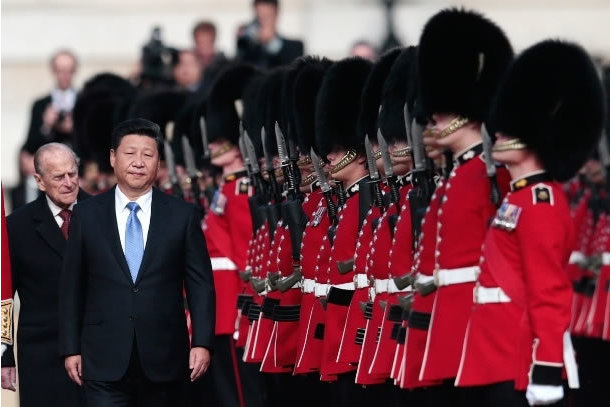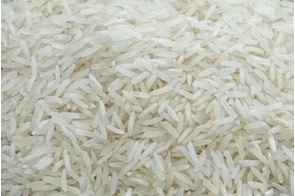After two centuries, China and the U.K. switch roles

Summary
The United Kingdom also recognizes that the rest of its economy has weakened, and so is seeking Chinese investment to build up its infrastructure and stimulate its manufacturing capabilities.
Tuesday, October 20th, saw the start of Chinese President Xi Jinping's four-day visit to the United Kingdom. Xi and his wife were greeted at London's Mandarin Hotel by British heir Prince Charles and his wife, Lady Camilla, before meeting Queen Elizabeth II and the Duke of Edinburgh and receiving a royal salute from the 1st Battalion Grenadier Guards. Among much other pomp, the Chinese first couple participated in a state carriage procession, had lunch with the queen and toured the Royal art collection; Xi also delivered a parliamentary address at Westminster Palace. As one newspaper put it, this was the reddest of red carpets. As a student of history, Xi could be forgiven for finding himself somewhat amused by this lavish display of respect.
In the sweep of time, Britain's deference to China is an extremely recent development – and as such, it is an interesting demonstration of the movement of the geopolitical tectonic plates. When Britain sent an embassy to China back in 1793 under Ambassador Macartney, the island nation was the world's coming power. The Industrial Revolution was well underway, and Britain was looking to extend its trading influence even further than its existing gains in India, the Caribbean, and until recently, the United States. But China, accustomed as it was to being more powerful than any external culture it had thus far encountered (with the exception of the Mongols, whom it ultimately absorbed), had not yet come to terms with the fact that its eternal dominance over all it surveyed would soon be coming to an end. Thus, when the Macartney Embassy arrived requesting the opening up of China's extremely restrictive trade arrangements, it was met with a largely negative response and went home empty-handed.
The following decades saw the prevailing trends continue. As the United Kingdom strengthened and the Qing Empire stagnated, British frustrations with China grew ever more pronounced. China, such a fertile source of exotic spices (most notably tea, to which Britons became addicted), was at the same time largely disdainful of the coarse English garments and mechanical whizz-bangs being produced by British workshops and accepted payment only in silver. London accordingly saw its silver reserves draining. The solution to Britain's problem presented itself when it discovered that the Chinese population could be tempted with illegal shipments of opium. An extremely lucrative triangular trade subsequently emerged in which Britain would grow opium in India and transport it to China, where it would be exchanged for tea, which would then make its way back to the United Kingdom. The Chinese government understandably was not enamoured of this arrangement: It saw its own silver reserves beginning to deplete and swathes of its population sinking into a narcotic haze.
A scrupulously honest official named Gov. Lin Zexu was tasked with solving the problem. Lin launched a war on drugs, which involved forcibly burning the stocks of British opium. He also wrote a letter to Queen Victoria – perhaps unaware of her more ceremonial than executive role – making the case that the British opium trade was immoral, especially since the substance was not being consumed in Britain at all but merely inflicted upon China. It is not known whether Queen Victoria ever saw the letter, but Lin certainly did not receive a reply from her. Instead, the United Kingdom mobilized its navy, and with Chinese forces proving largely ineffective against British technological advancement, captured two Chinese cities. The resulting Treaty of Nanking of 1842 saw the cessation of Hong Kong to Britain and the kind of opening up of trade that Macartney had failed to achieve through negotiations 50 years before.
In the decades that followed, the United Kingdom and China saw their paths diverge. Britain continued to build its empire, notably in Africa, while China watched helplessly as other European powers began establishing pockets for themselves on the Chinese mainland. Worse, the rise of Japan at the end of that century resulted in China having a technologically developed neighbour with imperial ambitions of its own, and China was soon suffering Japanese invasion as well.
When World War I forced Britain to cope with the rise of Germany, China saw an opportunity to at last gain a seat at the top table. It sent a large number of workers to help the Allied powers, particularly on the home front. Unfortunately for China, Japan's influence with the Western powers (with whom Tokyo had sided during the conflict) was stronger. Instead of regaining its territory, the 1919 Treaty of Versailles gifted former German territories on the Chinese mainland to Japan. This problem deepened even further as Japan invaded China in earnest in 1931. But by the outbreak of World War II, China and Britain were once again fighting on the same side, this time against Germany and Japan.
China's situation appeared to be improving as the war neared its end. It finally received the seat at that top table it had so desired, playing an important role at the Bretton Woods Conference, which reshaped the post-war world order – though China's representatives at the conference comprised nationalists increasingly beleaguered by the Communists. These hopes were soon dashed by the victory of the Communist Party in 1949, and China disappeared behind the Iron Curtain under Chairman Mao Zedong.
It was only Mao's successor, Deng Xiaoping, who then set it on the road to breakneck economic growth in 1978. As the British speaker of the House of Commons noted in his address, "China is attempting to complete an industrial revolution which took Britain the best part of two centuries in little more than two decades." China has now become the world's second largest economy, behind only the United States. Meanwhile, Britain, one of the two key architects of the Bretton Woods system along with the United States, has experienced the decline that eventually afflicts all empires. All the majesty of the old empire has lingered on, notably in the red-coated salute received by Xi, but the manufacturing capability has faded away, leaving the United Kingdom deeply reliant on its financial services sector.
Thus, the two countries appear to have switched positions. But this is where the similarities with the past end. For unlike the China of the 19th century, Britain is aware of its decline and attempting to counteract it by engaging with its visitor. For the United Kingdom, Xi's visit is partly about securing Chinese financial business to keep London as a global financial centre. The United Kingdom also recognizes that the rest of its economy has weakened, and so is seeking Chinese investment to build up its infrastructure and stimulate its manufacturing capabilities.
For Beijing's part, the idea of further internationalizing its currency through London is attractive, while British infrastructure provides a reliable repository for its accumulated capital after several years of poor returns in the developing markets. Gaining access to some advanced British intellectual property in the process might also aid the Chinese in their attempts to take their manufacturing further up the value chain. Finally, China will enjoy the opportunity to strike up a separate relationship with the United States' traditional closest ally in its attempts to emerge as a global power in its own right. The United Kingdom's signing up to the Asian Infrastructure Investment Bank against U.S. wishes earlier this year is another example of this trend.
The two countries, then, have much to discuss. With both sides having something to offer the other, this relationship has the potential to blossom where it previously broke down in acrimony. And so Xi's embassy has enjoyed considerably more hospitality in London than his long ago counterpart Ambassador Macartney once received during his visit to Beijing.
“After Two Centuries, China and the U.K. Switch Roles” is republished with the permission of Stratfor and under content confederation between Financial Nigeria and Stratfor.
Related
-
Nigeria arrests ivory traffickers connected to recent seizure in Vietnam
Comprehensive intelligence-led investigations by the Wildlife Justice Commission led to the identification and ...
-
I am a migrant
In 2014, Syrians accounted for 26% of the new foreign businesses registered in Turkey.
-
Rice exchange concludes first trades on digital marketplace
The platform was built by Fujitsu using Hyperledger Fabric technology, a modular blockchain framework.







